In this article:
Dandruff is a specific form of seborrheic dermatitis that is confined to the scalp. (1) Many factors contribute to this problem such as excessively dry or oily scalp, preexisting inflammatory skin disorders, poor hair and scalp hygiene, and microbial overgrowth on the scalp, to name a few.
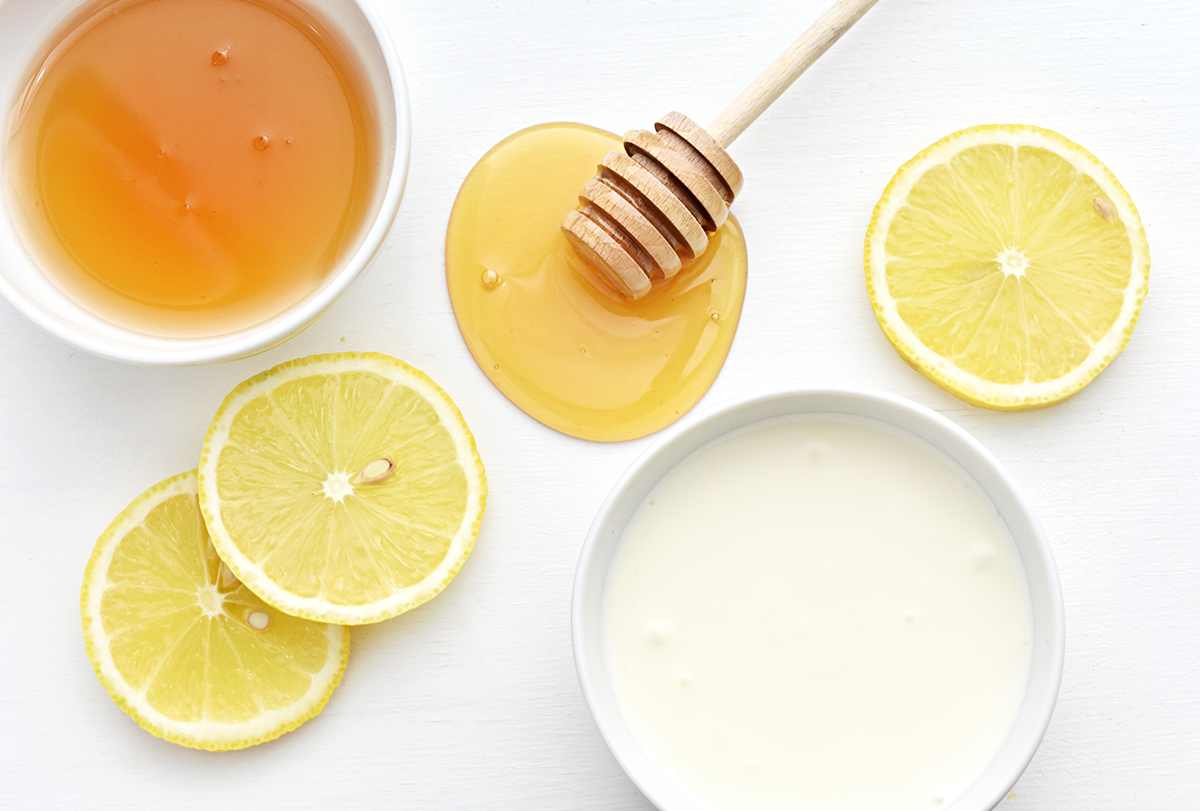
However, the primary underlying etiology of dandruff is the overgrowth of a type of yeast called Malassezia, which lives naturally on your scalp but triggers a fungal infection if allowed to overgrow.
Dandruff can reflect poorly on your appearance and hygiene, which can affect your confidence. Plus, it can make your scalp perpetually itchy and irritated, which can be quite bothersome.
This article will list easy home remedies that can help bring this problem under control without the risk of side effects.
Home Remedies to Treat Dandruff
The following remedies can help in the management of mild or early-stage dandruff, but they may not be very effective for severe cases. You must use them consistently for several weeks to see results.
Caution: Do a patch test before trying any of the remedies to prevent allergic reactions.
1. Neem and coconut oil
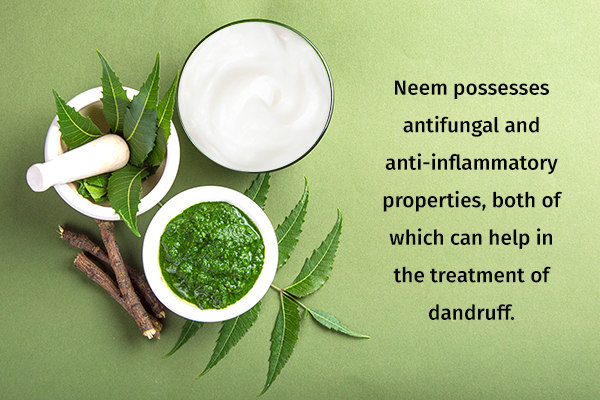
Neem possesses antifungal and anti-inflammatory properties, (2) both of which can help in the treatment of dandruff. This healing ingredient not only limits the yeast overgrowth responsible for dandruff but also reduces the itching and redness caused by it.
How to use:
- You can prepare a neem-based hair mask by grinding 10–20 neem leaves with coconut oil until they form a thick paste. You can replace coconut oil with henna and water. This hair mask works especially well during the summer months.
- You can also prepare a hair rinse by boiling some neem leaves for 10–15 minutes and then filtering out the liquid into a container. Let it cool down and use it to wash your hair multiple times after shampooing.
2. Tea tree essential oil and oatmeal
Tea tree oil contains compounds such as terpinen-4-ol that give it significant antimicrobial properties. It even works as an effective antifungal agent (3) against yeast species that give rise to scalp infections such as dandruff.
How to use:
- Mix a few drops of tea tree oil with 1–2 tablespoons of coconut or olive oil, and use this oil blend to massage your hair roots and scalp.
- You can also add a few drops of the above oil blend to your other DIY remedies or your shampoos and conditioners.
- If you have dry scalp, prepare a mask by mixing 2 tablespoons of oatmeal and just enough water to make a smooth, thick paste and then stirring in few drops of tea tree oil.
Note: You can also try other essential oils to combat dandruff such as lemongrass essential oil, sweet basil essential oil, clove essential oil, ginger oil, and neem oil.
3. Fenugreek, hibiscus, and yogurt
Fenugreek inhibits the proliferation of Malassezia, which naturally resides on the scalp but can give rise to dandruff if allowed to overgrow. (4)(5)
How to use:
- Take 1 tablespoon of fenugreek seeds in a cup of water, and let them soak overnight to soften.
- Put the softened fenugreek seeds in a grinder along with a few hibiscus leaves. You can add ½ cup of yogurt to the mix if you please.
- Blend the ingredients until you get a smooth, consistent paste.
4. Yogurt, lemon, and honey mask
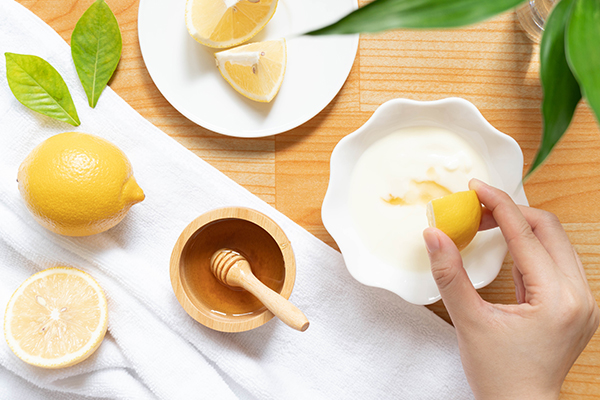
Yogurt owes its antifungal properties to the presence of lactic acid bacteria in it. (6)
How to use:
Mix 2 tablespoons of fresh unflavored/unsweetened yogurt with 1 tablespoon of honey (7) and 1 tablespoon of lemon juice to make a smooth paste.
5. Rice water rinse
Rice water contains selenium, which curbs the growth of dandruff-causing yeast Malassezia on your scalp. (8)
How to use:
- Use rice water to rinse your hair and scalp after shampooing. Adding some neem water to it may help deliver better results.
- Alternatively, you can use rice water to prepare any of your DIY antidandruff scalp and hair mask.
6. Aloe vera gel, lemon, and honey
Aloe vera gel is commonly used to treat symptoms of skin inflammation such as scaling, itchiness, and dryness, (9) which are symptoms of dandruff. So, you can use this medicinal gel to soothe the scalp discomfort caused by dandruff.
How to use:
- Simply extract the gel from a freshly cut aloe vera leaf, gently massage it in your scalp, and apply it all over your hair. Let it dry and then wash it off.
- You can also combine the healing goodness of both aloe gel and honey in the form of a hair and scalp mask. Mix 4 tablespoons of aloe gel with 2 tablespoons of honey and 1 tablespoon of lemon juice to form a paste.
7. Green tea hair and scalp rinse
Green tea is full of phenolic compounds called catechins that exhibit strong antioxidant activity, which can help curb fungal overgrowth and the scalp inflammation associated with dandruff. (10)
How to use:
- Mix 4–5 drops of tea tree or peppermint essential oil in ½ cup of green tea, and use this solution to rinse your scalp and hair.
- If you want a mask instead of a rinse, just mix some oatmeal powder into the solution to thicken its consistency. Oatmeal is credited with moisturizing and anti-inflammatory properties, besides being a gentle scrub that exfoliates the dead skin flakes from your scalp.
8. Onion and lemon hair mask
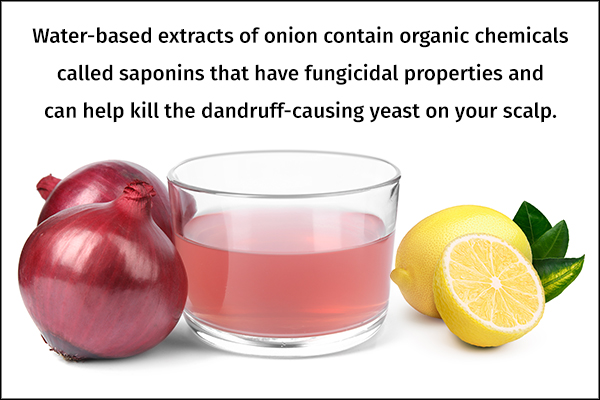
Water-based extracts of onion contain organic chemicals called saponins or ceposides that have fungicidal properties and can help kill the dandruff-causing yeast on your scalp. (11)
How to use:
Blend a big-sized onion with just enough water to make a smooth, thick paste, and then mix some lemon juice in it.
9. Curry leaves paste
Curry leaves are loaded with phytochemicals that can help treat dandruff.
How to use:
- Put 10–15 curry leaves in a grinder, add a little bit of water, and blend them to form a paste.
- Pour this paste in a bowl and mix in about ½ cup of plain yogurt and onion juice until it becomes completely uniform and lump-free.
How to apply hair and scalp masks and rinses
- Wash your hair and scalp with an antidandruff shampoo.
- Dab your wet hair with a clean towel to remove the excess moisture.
- Spread the mask onto your scalp and hair while they are still damp, and gently massage it in with your fingertips. If you are using a hair rinse, wash your head with the liquid multiple times after shampooing. You can put a bowl or any container under your hair to collect the liquid that drips down, and use it in the next rinse.
- Let your hair and scalp soak in the goodness of the mask or rinse for 15–20 minutes.
- Rinse it off with lukewarm water.
Antifungal Shampoos
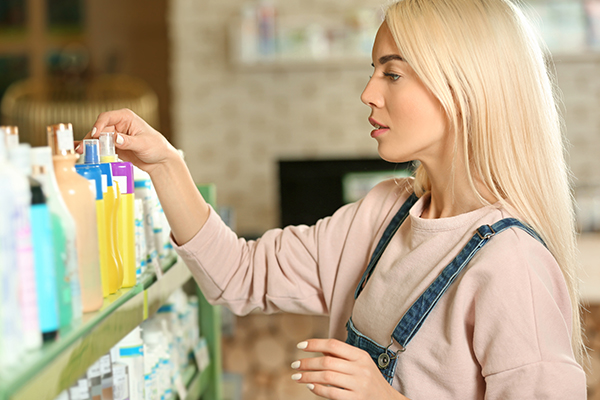
Several varieties of antifungal shampoos are available over the counter and can help treat dandruff at home. Here are a few key ingredients that you should look for in your antidandruff shampoo:
- Zinc pyrithione
- 2.5% selenium sulfide
- Tar (in low concentrations and for intense inflammation/redness and pruritus)
- Keratolytic agents such as sulfur or salicylic acid (for milder cases of dandruff)
- Tea tree essential oil, 10% lemongrass oil
- Ketoconazole
- Ciclopirox olamine
Caution: If you are pregnant or lactating, it’s best to consult your doctor before trying any medicated antidandruff shampoo as some of its ingredients, such as tar, can be harmful to both the mother and baby.
Self-Care Measures
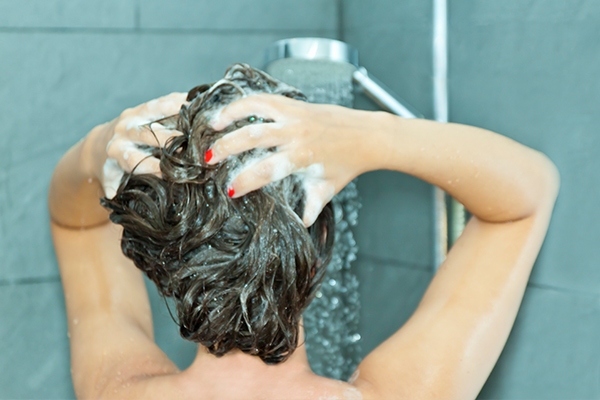
Here are some self-care measures that can help manage and prevent the progression of incurable conditions such as seborrheic dermatitis;
- Do not use hot water to rinse your hair and scalp as it strips away the natural oils and adds to the dryness.
- Wash your hair and scalp with an antifungal shampoo thrice a week.
- Always apply your hair conditioner starting from the hair ends up to the midlength of the strands, but never up to the scalp.
- If the cause of your dandruff is seborrheic dermatitis, living in a dry environment can make it worse. So, it is very important to maintain proper humidity levels inside your home, especially during winters when indoor heating sucks the moisture from the air. To that end, install a humidifier to restore moisture in the environment. Make sure to clean it frequently to keep it free of mold.
- De-stress as anxiety and psychological stress can also cause flare-ups of seborrheic dermatitis, (12) which will worsen dandruff. Try yoga, meditation, journaling, music therapy, tai chi, regular exercise, and getting 8 hours of sleep and rest.
- Add anti-inflammatory and antifungal foods to your diet. These include green tea, garlic, and foods rich in omega-3 fatty acids such as freshwater fishes, walnuts, avocadoes, flaxseeds, and chia seeds. Consume immune-boosting probiotics containing Lactobacillus acidophilus or Bifidobacterium and foods rich in vitamin C such as citrus fruits and berries. Also, increasing your dietary intake of vitamin B6, biotin, folate, vitamin B12, zinc, niacin, and riboflavin, which can also help reduce the severity and frequency of dandruff flare-ups.
Most-Asked Questions About Dandruff
Can I use apple cider vinegar to treat dandruff?
Apple cider vinegar (ACV) does exhibit some antibacterial and antifungal properties, (13) but experts do not recommend using it directly on your scalp.
You can, however, try ACV-based medicated shampoos that are specifically designed for controlling dandruff. Such products are safe for topical use as they contain ACV in limited and diluted amounts.
Can I prepare a lemon juice or baking soda scalp mask to treat dandruff?
Lemon and baking soda, (14) like cider vinegar, is known to possess antifungal properties (15) against a variety of fungi that cause common skin infections, but there is no research regarding their efficacy against dandruff.
Plus, lemon juice is highly acidic and can irritate the sensitive scalp skin, whereas baking soda is too alkaline and can lower the natural pH of your scalp, making it more prone to microbial growth.
Can I prepare an aspirin hair mask to treat dandruff?
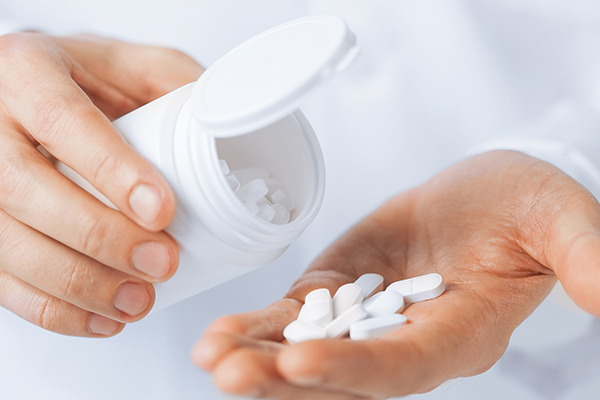
Aspirin contains salicylic acid, which works as an antifungal agent that can help treat scalp conditions such as seborrheic dermatitis and dandruff. In fact, it is often a main ingredient in numerous antidandruff hair products.
But the concentration of this acid in aspirin tablets and that in medicated hair products such as shampoos is different. Therefore, directly applying aspirin to your scalp to banish dandruff may neither be safe nor effective.
Final Word
Dandruff is extremely common and quite a nuisance, but the good thing is that most cases are mild and can usually be managed with proper hair care using medicated antidandruff products that are available over the counter.
The intense itching caused by this condition can make you scratch your scalp uncontrollably, damaging your hair roots and triggering inflammation. Plus, the buildup of dead skin flakes on the scalp can clog your hair follicles, hindering hair growth while also increasing the risk of scalp infections. All these factors can lead to hair shedding and can greatly impair the overall quality of your hair.
So, it’s best to treat the condition in its early stages to save yourself from such complications. The home remedies mentioned in this article employ the healing power of natural ingredients to control dandruff and ease the scalp discomfort associated with it. They are best used in conjunction with other doctor-recommended hair products and as part of an overall healthy hair care routine.

- Was this article helpful?
- YES, THANKS!NOT REALLY


